- Home
- Mick Foley
Tietam Brown Page 4
Tietam Brown Read online
Page 4
For just a split second, I grabbed hold of my quarters, then let them loose with a jingle and went on the defensive instead. “Well, Mr. Hanrahan . . .” Dead silence for a moment and then I brought up my shield. “It may be gone, but I don’t miss it.”
It took only a second for that laugh to ring out. But that laugh was a wonderful sound, like a solitary trumpet blast amid a symphony of silence. I turned, we all turned, to see its source, and to my wonder, that source was Terri Johnson. Then, as if Terri’s reaction had given the okay, a few more kids joined in. But not the squad, which kept a respectful silence in honor of their momentarily fallen leader.
But Hanrahan got up, dusted himself off, and immediately took the low road. “Okay, okay, that’s enough out of you, Big Tits,” and then an “I got her there, boys.” Which elicited a few weak laughs, solely out of courtesy, from the team.
Then his attention was back on me, for, after all, Terri was a cheerleader, and therefore an extension of the team, and even though her social dealings with Hanrahan’s ’roid warriors were minimal, there was no use picking on her when there were so many easier, weaker targets to choose from.
“Congratulations, Annie, you just made my shit list,” Hanrahan said. “And you did it in record time.”
Maybe I had, but as the local sports legend turned and picked out his next victim, I turned back to look at the girl with the auburn hair and smiled. And she smiled back.
So I had put up with the Annie stuff, and though I may not have liked it, I tried not to give it much thought, even as the name grew in popularity among the general student ranks, and my name, which had been given to honor a fallen soldier, became a big joke. But other than the name, Hanrahan gave me some space, and concentrated his main efforts on prey that didn’t talk back.
But this strange new romance between the school’s homecoming queen and the earless guy had clearly renewed Hanrahan’s interest in Annie Brown. So he began firing back, showing the tenacity that had made him a Pro Bowl nose tackle, before a knee operation sent him into early retirement with a full disability package to cushion the fall.
On this particular day, he was giving Bill Bradford a particularly hard time. Bradford was a soccer player, a fact that placed him just slightly below the common earthworm in Hanrahan’s eyes. As the goalkeeper on a team that was in dead-last place, Bradford was easy pickings for a man whose football team was 6‒0 and was steam-rolling its way toward a third consecutive sectional title. We were now studying the Civil War, and amazingly Hanrahan still hadn’t figured out the Antietam significance.
“Bradford? Bradford? . . . Is that name Swiss?” Hanrahan asked in a transparent act of interest.
“No, Mr. Hanrahan, I think it’s English,” Bradford said.
“Are you sure, Bradford?”
“Pretty sure, sir.”
“Well you looked like you were Swiss in yesterday’s game, Bradford . . . like you were Swiss cheese, that is!”
The team went into their celebration and Hanrahan ruled the joke to be a touchdown, and even I had to admit to myself that it wasn’t half bad. But Hanrahan wasn’t through.
“Maybe your coach ought to sit you on the bench, Bradford, how’s that sound? Yeah, sit you on the bench and let Jesus Christ take your place. Yeah, put Jesus in the goal, Bradford, how’s that sound?”
Bradford thought for a second and then said what was on just about everybody’s mind. “Sir, I don’t know what you mean.”
“You don’t, Bradford?” Hanrahan said with a smile, and I could tell that he was just biding his time waiting for the perfect moment, looking for that cheap shot which had been his forte on the gridiron. “Well, you see I heard . . . that . . . Jesus saves! Get it? Jesus saves!”
And with that the team roared and Hanrahan traded in his referee’s hat for a goalie’s stance, pretending to bat down shots while he yelled “Save, save.” He waited for the laughter to die down, which took a good while, as the sight of his huge body, his veins bulging like garden hoses through cantaloupe biceps, was actually quite funny to behold. Then he turned his gaze to Terri and focused it there, long enough for the entire class to sense tension. For Terri wasn’t laughing; to her the subject wasn’t a joke, a fact that wasn’t lost on the coach as he lowered his gaze from her face to her breasts. And kept it there. Then, while still staring, he said in a just barely audible voice, “Isn’t that right. Doesn’t he save? Just ask your father about Jesus. He’ll tell you.”
He then looked up from her breasts and glared at her, savoring the discomfort that his words had caused. Quietly, with great restraint, Terri spoke. “Mr. Hanrahan, I would appreciate it if you would keep the subject of my family’s faith out of your classroom.”
Hanrahan just stared, and Terri stared back, until he broke the silence at my expense. “Uh-oh, I’d better watch out or she’ll sic her boyfriend on me.” A cheap easy laugh. I grabbed for my quarters and held on to them tight as Hanrahan loaded more ammo and fired. “Hey Annie, there’s a thread hanging off your sleeve . . . Oh I’m sorry, that’s your arm!” He laughed with the class, hit a quick biceps pose, and then fired again. “Halloween’s coming up, Annie, maybe you can close one eye and go trick or treat as a needle.”
He ruled it a touchdown, and then used both outstretched hands to high-five players, who all hailed their leader, until the bell rang, signifying enough blood had been let for one day. Hanrahan called for attention and yelled out his homework assignments, which he liked to term “Han Jobs.”
“Okay, okay, class, you’ve got one week to complete the following Han Job. Give me a thousand words on the Emancipation Proclamation.” He then pointed to Russell Peterson, a child of African-American heritage, who in addition to being on the soccer team with Bradford also washed dishes with me twice a week at Frank ’n’ Mary’s, and said, “Peterson, I expect yours to be extra good. Let’s face it, without that proclamation you’d be picking cotton.”
Terri charged out of the class and called for me to follow. Through the cafeteria and into the courtyard, where she let out a bona fide scream. She clenched her fists, opened, then clenched again, and tried to talk but just let out a breath of air. Then, regaining her composure, she said, “How could he, Andy, how could he?
“He’s met my father one time. Once. For dinner after last year’s big game. Hasn’t even stepped foot in the door of my father’s church. So where does he get the nerve to criticize him?”
“Terri, if you can’t stand Hanrahan and you don’t like Clem Baskin and that bunch, why in the world do you cheer for their team?”
She mulled it over for a second, because in reality I’d hit the nail on the head. Terri didn’t even like football, had only one or two friends on the team, was ostracized by her fellow cheerleaders for being a prude or a “CT,” as they called her (a phrase that took me a while to decipher), and hated the coach’s guts. Then she smiled and gave me an answer that was hard to refute. “Because I know you like the way I look in the sweater, big boy.” And when I blushed and looked down, she picked up her offense. “Come on, Andy, admit it. You might as well. Because I saw you staring that very first week. Staring at my boobies, Andy. Yes you were, you bad boy.”
Now she was reprimanding me as if I was an untrained pup caught in the act of chewing his master’s new shoe. I loved every second of it.
“Come on, Andy,” she continued, “tell me your thoughts, you naughty young boy, why were you staring at my boobies?”
Maybe you had to be there to understand, but trust me when I say that the tone was not sexual in the least. It was fun, and gentle and innocent, and when she told me to be careful, because they were actually dangerous weapons, well who was I to disagree. And when she ran after me with both boobs in her hands, yelling in sixties-horror-film-style, “GONNA PUT THEM ON YOU ANDY . . . GONNA PUT THEM ON YOUUUU!” I had no choice but to run.
When I looked back at her, as strange as it sounds, it wasn’t the dangerous boobies that first caught my eye. It was her
smile. The happiest, friendliest smile in the world.
October 30, 1985 / Evening
Tietam Brown looked out the front window, his arm pulling the curtain back, his face pressed to the glass like that of a five-year-old looking for the faint glow of Rudolph’s red nose on Christmas Eve. He stood in that position for so long that I became a little concerned. “Dad . . . Dad, are you okay?” I said, and then waited for about a minute for some type of reply. Without moving his face from the glass, he finally said, “Will you look at that, Andy, will you look at that?”
“Look at what, Dad?” I replied, and Tietam Brown just said, “Damn Sugling,” and continued his long stare before adding, “Always trying to show me up . . . damn Sugling.” Finally he turned away and summoned me to his special reconnaissance perch, where the glass was still fogged from his breath.
I looked, expecting some type of small emergency, and instead saw Charlie and Gloria Sugling erecting a small scarecrow, surrounded by a couple of simple pyramids of pumpkins, outside on their front lawn. Behind me, I heard my dad say, “Can you believe it?” and I wondered in silence just what the hell he was talking about.
He then whispered, as if we were caught up in some web of conspiracy, “Always trying to get one up on ol’ Tietam, Andy, always trying to stick it to your old man.” Finally I couldn’t take it anymore, let out a nervous laugh, turned from the window, and said, “Dad.”
“Yeah, Andy?”
“You’re starting to scare me a little.”
“Why’s that, kid?”
“Because I have no clue what you’re talking about. All I see is Mr. and Mrs. Sugling decorating their yard.”
Tietam put his palm to his balding head, joined me by the window, put his arm loosely around my neck, and said, “Exactly. That’s exactly what I’m talking about. They’re decorating their yard.”
Great. That cleared up everything. Now my dad really was starting to scare me.
“Andy,” he said, “last year, before we got back together, I put up a hell of a Christmas display. Lights, an electrical Santa Claus, the works. Then Sugling, who had never so much as had a tree in his house, decides he’s going to become Thomas Allen Edison and light up his whole house like it’s Yankee Stadium. People were coming around in their cars just to look. So now here it is, October, I put out a hell of a Halloween display, and Sugling, who last year didn’t even buy candy for the kids, and then hid in his house with the lights off so no one would knock, decides one day before Halloween that he’s the Great Pumpkin or some damn thing and tries to outdo me again. Well screw them, I’m tired of the Suglings screwing Tietam Brown all the time.”
I tried not to laugh, but man, it was hard. The veins in my father’s neck were bulging out, and his hands were shaking he was so mad, and I didn’t have the nerve to burst his bubble and tell him that his big speech was about the most ridiculous thing I’d ever heard.
First he’d talked about how he and I had “got back together,” as if we were Simon and Garfunkel planning a reunion concert instead of a father and son who hadn’t seen each other in seventeen years. Then he’d mispronounced a middle name that most ten-year-olds would know, before talking about his “hell of a Halloween display” as if our house was the set for The Shining or something. The guy had literally put a pumpkin on each side of the front steps, and a sign that said “Boo” on our front yard. Total time invested . . . maybe three minutes.
But most ridiculous of all was his contention that the Suglings were always screwing him. Because how I saw it a week earlier, or I guess “how I heard it” might be more accurate, it had been Tietam Brown screwing the Suglings . . . or at least one of them.
My dad’s face lightened up a little, and his veins disappeared back under his skin, and he shook his head and said, “Not anymore, Andy, not anymore. You know why?” I shrugged my shoulders. “Because this Christmas, Andy, we’ll have a setup that you won’t believe. People will drive by to see our house, Andy, and as for Charlie Sugling and that little wife of his, well they’ll just have to live with it.”
He looked up just slightly, as if picturing this whole scene on our living room wall, and said, “I don’t know how yet, Andy, but we’re going to do it. And they’ll just have to live with it.”
I looked up at the same spot on the wall, briefly tried to envision this holiday extravaganza, and had to admit to myself that it sounded pretty good. I’d been listening to Nat sing the season’s virtues for years, but had pretty much been void of any Christmas cheer for the last decade or so.
A nudge from my dad brought me back. “I nailed her, you know,” he said, and when my mind drew a blank, he filled it right in. “Mrs. Sugling, I nailed her.”
“I know, Dad,” I replied, and looked at him looking at me, a big smile on his face, as if he was a child who’d just handed his mom a good report card and was waiting for a pat on the head. “I know you did, Dad.”
“And,” Tietam said.
“And what, Dad?”
“And . . . did she sound like she loved it?”
“Yeah, it sounded that way to me, Dad.”
Satisfied, he adjusted the curtain, patted me on the back, and walked up the stairs. Triumphantly. Then he walked halfway back down, looked down at me, laughed, and said, “You’re damn right she did, Andy, you’re damn right she did.”
Later over dinner, a microwavable monstrosity that was barely edible, he became the vision of the concerned parent. “So Andy, tell me about this big dance.”
I told him about the Superdance, an annual all-night affair that the school held to raise money for muscular dystrophy.
“Man,” he said, “that’s a lot of dancing. You ever danced before, Andy?”
“No, how about you, Dad?”
“Only between the sheets, kid. Only between the sheets.” Then, while chewing a piece of chicken that looked to be tougher than the Pittsburgh Steelers front line, he said, “When does it start?”
“In about an hour.”
“Need a ride?”
“Yeah, Dad, that would be great.”
He swallowed hard, put his elbow on the table, and rested his chin on his hand as if he were Rodin’s The Thinker.
“Andy,” he said.
“Yeah, Dad.”
“Maybe you can have the car for the night.”
“Really?”
“Sure, I’ve got some work to do anyway. Besides, this is a big night, but hey, no drinking, all right?”
Man, this was pretty cool. Real interest in my life, real honest-to-goodness parental concern, and the keys to the car for eight hours of Terri. So what if I’d never danced. I could always learn, right?
Then Tietam spoke, and as was becoming his custom, he was right there to seize the special moment with just the perfect sentiment. “You might want to get her to polish your knob while you’re driving, kid. No feeling like it in the world.”
Sometimes I kind of envied the little world my father seemed to live in. A world where making a scarecrow was a bigger sin than nailing the next-door neighbor’s wife and where drinking behind the wheel was no good, but a one-handed kid with no license, spasming wildly while trying to drive along unlit back roads, was okay. I thanked him for the suggestion and told him maybe I’d try, and he slid me the keys and wished me good luck.
I put the keys in my pocket and headed up the stairs, where I turned on the shower. I stepped in and replayed the day in my mind, smiling a big goofy smile as the room turned to fog and the water beat down on my neck.
I thought about Hanrahan’s class, and how not even his Neanderthal ways or his football cronies could ruin the day. I thought about Terri, and how she’d stayed so calm and strong on the outside even while boiling within. Then I thought about that wonderful smile, while she laughed and chased me with her breasts, and all of a sudden the thought of her holding her breasts while chasing me didn’t seem so gentle or innocent. No indeed, it seemed pretty damn sexy, and I closed my eyes and imagined that same scene, e
xcept in this scene she was naked, and I wasn’t running away. No, I was running right toward her, running hard. Literally.
I looked down and something about me had changed physically. Had changed quite a bit. I assessed the situation a moment longer, and, with the help of a handful of my dad’s pale blue Head & Shoulders, participated in the ritual that so many millions of teenage boys before me have performed, and that so many million have likely performed since. But unlike those horny teenagers, who were just obeying their hormones, I was accomplishing a whole lot more. I was practicing. Practicing and building up endurance, getting ready for the day when I wouldn’t be the only one involved in my sexual encounters. And when that time came, I knew I’d be ready. And that I’d be good.
The nuns at the Petersburg Home for Boys had referred to it as “touching oneself in an impure way.” One, Sister Fahey, had even tried to explain nocturnal emissions by likening our equipment to a kettle that just occasionally “boils over” as we sleep. I was thirteen at the time, and honestly had yet to touch myself in an impure way. To me, this boiling-over process sounded a little scary, and so I instantly concocted a solution that made a whole lot more sense, not to mention would ruin a whole lot less undies.
“Excuse me,” I said, “but if we know that our kettle is going to boil over, wouldn’t it make sense for us to pour some water out ourselves before we go to sleep?”
The class roared with laughter, and I received a rap on the palm with a ruler and a lesson about “the sin of Onan” from the nun. But my hand didn’t hurt because she had smacked the dead one, and to tell the truth I had loved the laughter from the class, as it was usually the only gesture of acceptance that I received. So a moment later I raised my hand, and shared with the class my biblical knowledge.
“Yes, Mr. Brown,” Sister Fahey said.

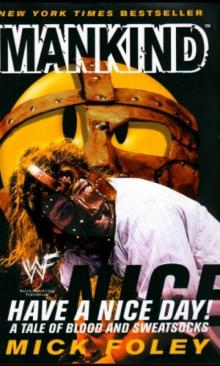 Intro
Intro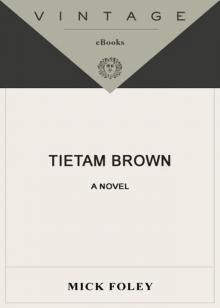 Tietam Brown
Tietam Brown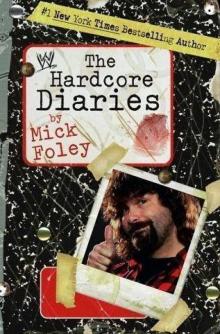 The Hardcore Diaries
The Hardcore Diaries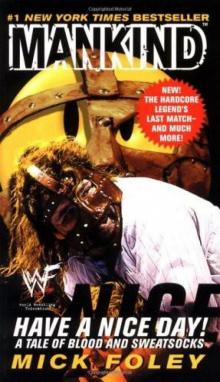 Have a Nice Day!: A Tale of Blood and Sweatsocks
Have a Nice Day!: A Tale of Blood and Sweatsocks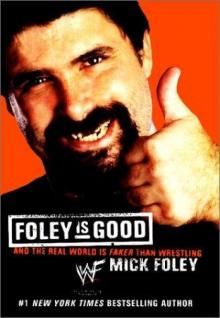 Foley Is Good: And the Real World Is Faker Than Wrestling
Foley Is Good: And the Real World Is Faker Than Wrestling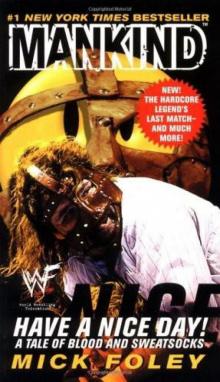 Have a Nice Day
Have a Nice Day